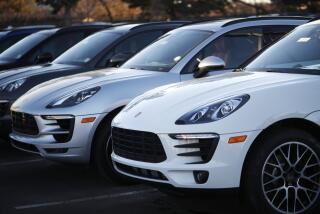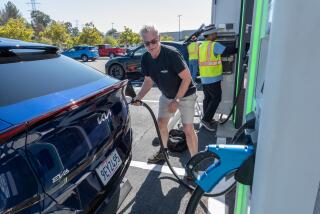Smart Fortwo Electric Drive: Half the car for nearly twice the price
In the hullaballoo surrounding last year’s debuts of the Chevrolet Volt and Nissan Leaf, one new electric vehicle was mostly overlooked: The Smart Fortwo Electric Drive.
It was an understandable oversight — and not just because of the cars’ microscopic size. Smart USA is a bit player in the auto market. Just 6,000 gas-powered Fortwos were sold in the U.S. in 2010.
Engineered by Mercedes-Benz, manufactured by Daimler and distributed by Smart USA, a wholly owned subsidiary of Penske Automotive Group, the internal-combustion cult car is being joined by 250 Smart Fortwo Electric Drives. The two-door, two-seater, rear-engine cars are available for the first time in the U.S. and only for lease.
The cars have been available since late last year and in such a minuscule quantity that you’d think every last one would have been snatched up by now. Yet Smart still has dozens available.
The reason is simple: Its price exceeds its benefits. Leases last four years and cost $599 a month for the coupe and $649 for the convertible. Each require a $2,500 down payment. For a company called Smart, it’s one of the dumbest pricing strategies a company could have in such a value-oriented marketplace.
The Nissan Leaf (with a $1,999 down payment) and Chevrolet Volt (with a $2,500 down payment) lease for $349 and $350, respectively, for three-year terms and offer better mileage and more room.
Price-wise, the Fortwo Electric Drive suffers even when compared with the all-electric, lease-only BMW Mini E, which cost $850 a month for a one-year lease when it first became available and dropped to $600 per a month when lessees renewed. The BMW lease required no money down and included installation of a wall charger.
Priced more reasonably, the electric Smart might stand a chance, because there is quite a bit to like about this uber-compact — mostly when compared with its gas-powered sibling.
Driving the electric Smart Fortwo coupe costs about 3 cents a mile to operate versus 10 cents for the premium-gas-powered version, using the EPA’s combined figures for both cars and current prices for premium gas and electric-vehicle electricity rates in Los Angeles.
As gas prices continue their steady creep upward, that alone is a fantastic selling point. The other major benefit to the electric Fortwo: The glitchy, self-shifting manual transmission of the gas version — the one that makes drivers look as if they’re bucking broncos even when the shifting is done by the car — is gone. The single-speed, or direct-drive, electric doesn’t have or need a transmission.
Powered by a 30-kilowatt permanent magnet motor and 16.5-kilowatt-hour lithium-ion battery pack, the electric Smart isn’t particularly torque-y on takeoff, but I found it ample in L.A.’s usual molasses traffic where it isn’t necessary to quickly come up to speed.
The electric Smart I was driving is the car’s second generation. The first generation debuted in 2007 in London and taught Smart that the distance a car can travel on a charge was more important than speed.
The second-generation Smart can travel 63 to 98 miles per charge. I averaged about 70 miles. The car’s maximum speed is 65 mph.
Sixty-five isn’t ideal for freeway driving, but, again, it is mostly adequate in Southern California, where traffic is frequently at a standstill. There were a few times when I was traveling midday on the 5 Freeway and was forced to stay right and be dwarfed by semis, but for the most part I felt safe, mostly because I felt visible enough.
Considering how long the Smart Fortwo has been on the market, it was surprising to see how many people still look and smile when they see it. The electric version is no exception, with its green body trim and wheels.
Personally, I prefer a more sedate color scheme, which is easily accommodated with Smart cars since their body panels are made from plastic and are easily swapped and customized. Yes, plastic. They are not steel or aluminum.
Wisely, Smart has doubled the number of airbags in its 2011 coupe in both the gas and electric versions. There are now eight.
The electric version hasn’t been aerodynamically optimized. Although the suspension was retuned to accommodate the heavier electric drivetrain, the car has the exact same chassis and dimensions as the gas version.
That is to say, it’s small, but not from the driver’s seat, where I found I had more than enough legroom and headroom. When a 6-foot-4 friend drove it, she marveled at its visibility and accommodation for her exceptionally long femur.
That said, I repeatedly found myself exiting the vehicle, closing the door and expecting to find more car. But it ends shortly after the door seam. In the week I drove it, I wished for more interior space on only one occasion — when I wanted to go to a park and ride bicycles with my 8-year-old son. We rode our bikes directly from our house to a different park instead.
The Smart’s size is a mixed bag. Philosophically, it’s a win, because it requires fewer resources to build. In practical terms, I loved being able to park in spaces I wouldn’t ordinarily attempt in my daily drive. And the turning radius was supreme.
But its dwarfism made for some odd handling at speed, when I found the steering stiff despite the electric power assist. The 15-inch wheels were fine on streets, but they danced in grooved pavement at highway speeds.
Although quiet and comfortable, the electric Smart isn’t as evolved as the Leaf or Volt, which are roomier and handle, for the most part, like regular cars. They’re also equipped with many of the creature comforts modern drivers have come to expect. Comparatively, the Smart is rudimentary.
The displays aren’t nearly as high-tech or comprehensive as other electrics, either. They are, however, straightforward and easy to see.
There are two circular gauges mounted side by side in the center of the dash and angled toward the driver, staring me down. The left gauge told me the percentage of battery charge. On the right, I could see whether I was drawing from or adding to the battery’s charge.
The Smart Fortwo is not a perfect electric. It is literally half the car for almost twice the money of other electrics on the market. Still, the Smart Fortwo is a crucial piece of Mercedes’ plan to meet ever-stricter U.S. emissions requirements.
Penske said last week that it lost money on Smart last year. A Mercedes-Benz spokesman said some of its dealers may take over distribution this summer. The U.S. is the only market in the world where Smart is not distributed by Mercedes.
At least lessees of the current-generation electric who have signed up to pay $599 a month until 2015 will get to upgrade into the next-version electric for free.






